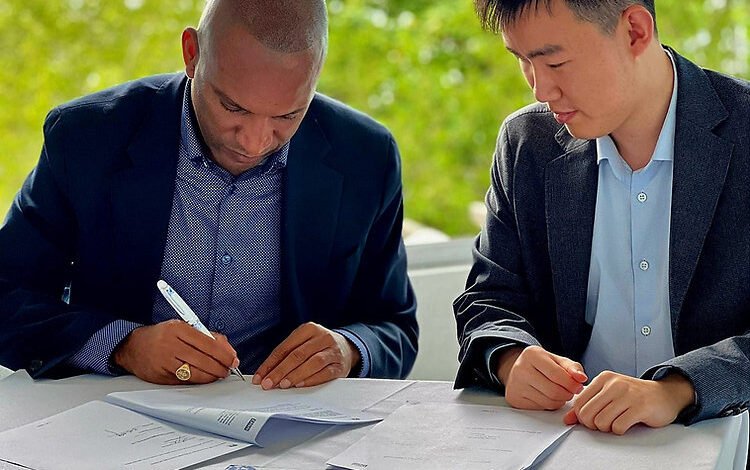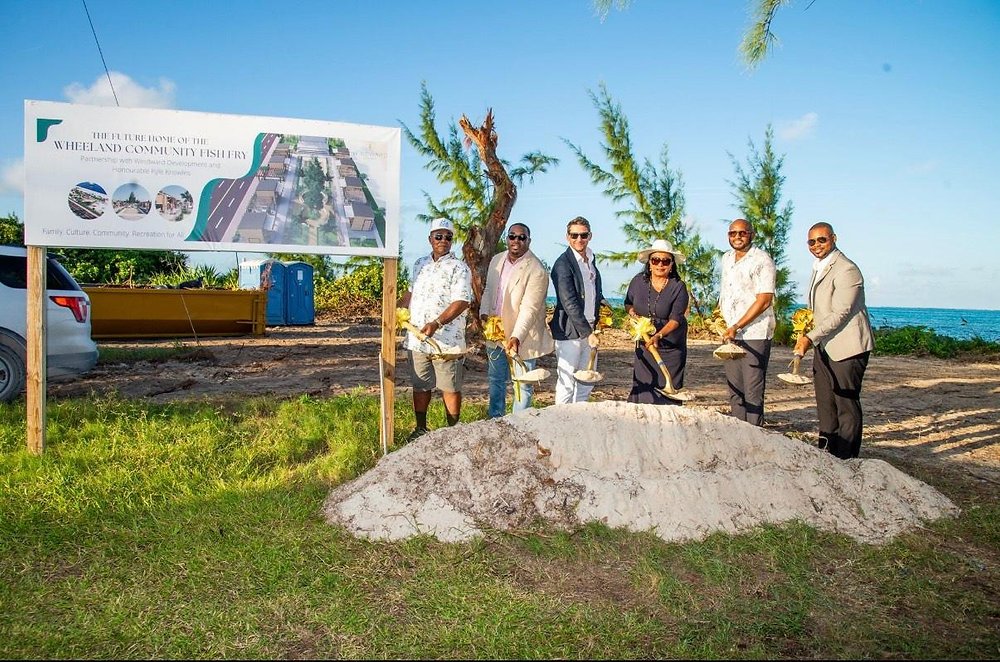E. Jay Saunders’ DSS and Huawei Announce Strategic Digitalization Partnership

The event, which centered on the signing of a Memorandum of Understanding (MOU) between the two organizations, highlighted their shared vision to promote digital innovation and improve financial inclusion in underserved markets.
The MOU extends beyond mobile money, focusing on strategic cooperation in areas such as Smart Cities, Smart Government, and Smart Education.
E. Jay Saunders, CEO of DSS, emphasized the potential impact on TCI, stating, “Huawei’s advanced ICT technologies could help us drive down the cost of living across our islands.”
Huawei’s Vision for Digital Transformation
David Wang, CEO, Huawei Cloud Central America and the Caribbean, echoed Liu’s sentiments, emphasizing the transformative potential of digital wallets. He drew parallels with successful global platforms like Alipay and PayPal and shared his excitement about bringing similar solutions to underserved regions.
E. Jay Saunders’ Vision for DSS and Mobile Money
E. Jay Saunders outlined his company’s long-term vision for mobile money. Reflecting on earlier efforts in mobile credit-sharing solutions, Saunders shared how these experiences inspired DSS’s mission to create mobile money ecosystems that cater specifically to unbanked and underbanked populations.
He highlighted the significant challenges faced by those without traditional banking access and the global efforts to address financial inclusion, referencing initiatives by the World Bank, United Nations, and the Bill and Melinda Gates Foundation. Saunders noted that DSS aims to fill the gap left by mainstream mobile wallet solutions like Apple Pay and Google Pay, which primarily serve individuals with existing bank accounts.
Revolutionizing Mobile Money: The DSS Model
Unlike traditional mobile wallets, DSS’s solution will operate as a B2B product offered through telecommunications carriers. Saunders explained that this approach mirrors the credit card industry’s evolution, where financial institutions issue Visa or MasterCard under a unified ecosystem. Similarly, DSS will provide carriers with a ready-to-deploy mobile wallet platform, enabling them to reach unbanked populations without investing in their own infrastructure.
The ecosystem envisioned by DSS and Huawei will allow mobile wallet users to conduct transactions seamlessly across borders. For example, a mobile wallet issued by a TCI carrier could be used in China, Africa, or the Bahamas, ensuring global interoperability.
Saunders shared that there are approximately 750 mobile carriers worldwide, of which 450 lack mobile wallet solutions. DSS aims to target these carriers, starting with regions that have large unbanked populations, such as Haiti, Jamaica, and Guyana.
The Role of Huawei in Enabling DSS’s Vision
The partnership with Huawei plays a pivotal role in making this ambitious project viable. Saunders revealed that Huawei’s competitive cloud pricing enabled DSS to finalize the business case for global deployment. With Huawei’s support, DSS plans to launch the beta version of its mobile wallet solution in the first half of 2025, followed by rigorous testing of financial and regulatory systems.
The MOU between DSS and Huawei extends beyond mobile money. It encompasses strategic cooperation in areas such as Smart Cities, Smart Government, and Smart Education. Saunders emphasized that this collaboration does not imply government contracts for Huawei but provides DSS with access to cutting-edge technology and expertise.
Potential Impact on TCI
While the mobile wallet service will not initially launch in TCI, Saunders highlighted its potential to address local challenges, such as unreliable banking services on smaller islands. He proposed innovative solutions like electronic check deposits and collaborations with banks to provide financial services to underserved communities.
Saunders also discussed futuristic possibilities, such as leveraging China’s expertise in air taxis to solve transportation issues between the underserved islands within the TCI.
Q&A Highlights
The press had several questions about the partnership’s details and
implications:
• Lifespan of the Partnership: Alex Liu confirmed that the MOU is initially for two years, with plans for renewal and long-term collaboration.
• Worker Payments via Mobile Wallet: Saunders outlined a scenario where contractors could use the wallet to deposit funds directly to employees’ mobile wallets, eliminating the need for traditional banking.
• Collaboration with Global Services: Responding to a question about compatibility with ride-hailing services like Uber, Saunders noted that the ecosystem could easily integrate such solutions in the future.
• Addressing Banking Challenges in Small Islands: Saunders described potential partnerships with banks to facilitate check deposits via high resolution images, addressing the lack of banking services in remote
areas.
• Expansion Plans: Saunders confirmed DSS’s intention to pitch the mobile wallet solution to carriers in regions with significant underbanked populations, such as Haiti, the Dominican Republic, and Suriname.
Looking Ahead
Saunders concluded the luncheon by highlighting the transformative potential of this partnership. He likened DSS’s strategic relationship with Huawei to collaborations with global tech leaders like Microsoft or Tesla. By leveraging Huawei’s innovative technologies, DSS aims to position itself as a leader in digital financial services and pave the way for TCI to become a regional hub for digital innovation.
This luncheon marked the beginning of a bold initiative to revolutionize mobile money, bridge the digital divide, and foster economic inclusion on a global scale.




